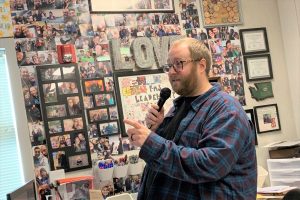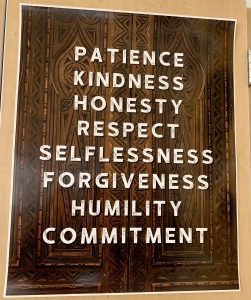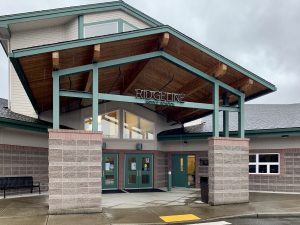
“Character is just the combination of your choices.” That’s how Ridgeline Middle School teacher Ryan Healy summarizes the content of the character development classes he teaches.
Near the end of his first semester course with seventh graders, the class was focused on building trust. In pairs throughout the room, students took time to discuss three questions:
1. what they would want to know about the future if they had a crystal ball,
2. what quality or ability they’d like to have (super powers included), and
3. what they would do differently if they knew they wouldn’t be judged.
“Ask questions, really listen, and respond with thoughtful questions,” advised Healy, who was the 2019 ESD 113 Regional Teacher of the Year.
In full class debriefs about their conversations, students shared answers and offered reflections.
“I want to learn to ask better questions,” one student said.
“We had more of a conversation than yesterday,” said another.
With the exercise, students practice having authentic conversations to build stronger relationships.
“Social and self-awareness are challenging for this age of students, developmentally,” Healy said. Throughout the semester, students improve their skills. “They notice and pay attention to things that they weren’t able to see before, which is so important to functioning in a community.”

Former students of Healy’s credit his character development and leadership courses with enabling them to succeed in jobs and relationships.
Abby Middleton is a Yelm graduate and a wholesale representative at a private company. She said character development enabled her to better relate with people from different backgrounds.
“After high school I started working in an environment I was not use to, it was much different than the people or surroundings I grew up with. But through leadership I learned how to build relationships with people that are different than me and what I am used to,” Middleton wrote in a note to Healy. “In a school that everyone knew each other’s name, saying ‘Hi Abby’ in the hallway didn’t seem as significant, but in a business where new people are in and out, I knew that saying someone’s name made them feel noticed and appreciated, and that simple task was the start to many of my work relationships.”
“I think I learned the true meaning of empathy,” wrote Kelsey Travis, a Yelm grad and case manager for the Department of Children’s Services in Tennessee. “I am able to respond and act so much more intentionally and know when to speak and when to listen.”
Healy first encountered the idea of character development education more than a decade ago. He sees it as a critical opportunity to support students’ mental health.
“They need reliable tools,” he said, as they are deciding how they are going to be in the world. “This course is trying to help [students] be aware of the choices they can make and what works for each of them. It’s not prescriptive.”
At Ridgeline, about half of the student body (the school has about 675 students, according to the Office of Superintendent of Public Instruction), will take one of Healy’s semester-long courses this year. The classes are offered as electives.

The work on traits such as respect, patience, and kindness seems to have a positive effect on school culture overall. Anecdotally, Healy noted higher test scores and lower discipline rates when more students are engaged in the courses.
Adults in the building also benefit from character skills. Teaching the course has demanded that Healy do his own work, he said. “Adults set the culture and kids mirror it.”
Toward the end of the seventh grade class period, students were eager to share about their trust-building conversations. One student said she wanted to experience fewer awkward silences. Healy validated that goal, and pointed out the value of silence in allowing space when talking to another person, particularly about serious topics.
When asked which abilities students wished they had, they were forthcoming with their answers.
“I wish I could copy down exactly what’s in my head.”
“I would be good an any sport.”
“I would find a cure to all sickness.”
***
Thank you to Ryan Healy and his students for inviting Ready WA to visit!